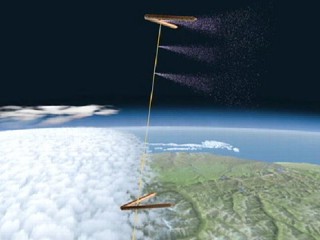Luke 2:1-20
I want to talk with you tonight about the shepherds. As you no doubt know, the story of Jesus’ birth is only told in two of the four New Testament books called Gospels. Matthew and Luke are the ones that include birth narratives. Matthew doesn’t even mention the shepherds. But in Luke’s telling of the story of the first Christmas, the shepherds play an important part. Why? And what has that got to do with you and me on Christmas Eve, 2009?
The mystery of those questions increases when you learn more about shepherds.
In first-century Judea, where Jesus was born, shepherds didn’t have very positive reputations. In a society that viewed wealth as a sign of God's favor, the shepherds were poor, paid poorly by the owners of the sheep of which they took care.
They were loners accustomed to spending their lives in fields where they made their homes, unafraid of the terrors of the night that might be brought unannounced by bandits or wild animals. Shepherds were tough. And like Moses, who lived and died about 1500 years before Jesus was born, many who became shepherds likely were running from the law.
When I think of the shepherds Luke talks about in the Christmas story, I think of men like the cowboys of the American West. The shepherds might have been the kind of people you wanted at your back when you got into a scrape. But they were so independent and untethered that if you had to spend any time with them, you would want to sleep with one eye open and keep your hand close to a weapon.
It was to these kinds of people—tough, grizzled, impoverished, fearless loners—hated by society and often themselves contemptuous of society, that heaven chose to make the first announcement of the birth the Savior, Messiah, and Lord of the world.
Luke tells us about the shepherds’ role in the events of the first Christmas in just two scenes, both of which appear in our Gospel lesson.
I only want to talk about the first of those scenes. It starts out this way: “In that region there were shepherds living in the fields, keeping watch over their flock by night. Then an angel of the Lord—one single angel--stood before them, and the glory of the Lord shone around them, and they were terrified.”
The shepherds were terrified? These guys accustomed to fending off thieves and killers and wild animals in the dead of night were terrified. For us, it would be like imagining John Wayne being terrified. Of what? Of one angel? Maybe.
But here’s where I think their terror came from: “the glory of the Lord shone around them.”
To us, that phrase--"the glory of the Lord"--may not mean much. We have so domesticated God, turned God into such a buddy, that we seem to have lost any sense of how supreme, how infinite, how great, how perfect God is.
If the prospect of coming face-to-face with God doesn't terrify us a bit, our understanding of God is impoverished. It is incomplete.
Believe me, there couldn’t possibly enough Xanax, Zoloft, or Prozac in the universe to fend off the anxiety you and I should, if we're in our right minds, feel about coming into the presence of God’s glory!
Although I yearn for the day when I see my Lord face-to-face, I know that I will also blush and shudder and shake at the knees when I do:
God is sinless; I'm not.
God is supremely powerful; I’m weak and mortal.
God loves perfectly; I love imperfectly.
God forgives; more often than I want anybody to know, I keep score.
If it weren't for the Christ Child Who brings forgiveness to all who repent and believe in Him, the very thought of being in the presence of God's glory would leave me in a perpetual state of terror.
What right does a sinner like me, or like those shepherds, or maybe like you, have but to expect the rightful judgment and condemnation of God over our lives?
None. In truth, the Bible teaches that you and I have no rights and we certainly have no right to stand upright in the presence of God!
When those unsavory shepherds were surrounded by the glory of God, they were confronted vividly, powerfully, and unmistakably with the fundamental reality of human life: God is God and we are not.
And in the same moment, the shepherds, in the brilliant light of God’s glory would have also seen the truth about their own sin and their need to be saved.
I hope that on this Christmas Eve, as we light the candles, the glory of God will fill our hearts and minds and wills so we can see that we cannot John Wayne our way into eternity. We can’t be strong enough, good enough, smart enough, tough enough, or accomplished enough to gain peace with God or peace with ourselves. We need a Savior.
Our Gospel lesson tells us that while the shepherds were transfixed in terror, more happened. The “angel said to them, ‘Do not be afraid; for see—I am bringing you good news of great joy for all the people: to you is born this day in the city of David a Savior, who is the Messiah, the Lord. This will be a sign for you: you will find a child wrapped in bands of cloth and lying in a manger.’”
Jesus had come, the angel told the shepherds. He was the Savior of the world, the Messiah, meaning God’s Anointed One or, as we say it based on the Greek of the New Testament, the Christ, and the Lord, meaning He is the King of everything.
Yet they would find Him, the angel said, barely clothed on a cold Judean night, lying in an animal’s feeding trough.
In Jesus, God laid aside the privileges of His deity. He left the pleasures of heaven. He submitted to the difficulties of this life. He absorbed within Himself the brutal reality of death and sorrow. And He let go of them all—privilege, pleasure, power, and comfort—in order to grab hold of, to restore, to make new, to enliven something infinitely more important to Him than any of those things. He came to do all of these things for you. He came to die on a cross and rise from a tomb in order to erase the power of sin, death, and futility over your life.
The angel called his message good news, euangelion in the original Greek in which the New Testament was written. Another word that translates euangelion, from the Old English, is Gospel. That night, the angel had good news for the shepherds:
They weren’t alone; God had come to them.
They didn’t need to be utterly ostracized; God was willing to forgive and befriend them.
They need not live in futility or die in despair; God had come to give abundant life to all who would surrender to the Lord in the manger.
They didn’t have to be afraid; the God of infinite perfection, power, and holiness didn’t want to condemn them to a life or an eternity without Him.
Is it any wonder that after the shepherds heard the angel’s message and then watched an army of heavenly beings sing God’s praises that they quickly sped to Bethlehem to find the baby?
 And tonight, the angel’s good news is good news for you as well. You too can come to the Savior, Messiah, and Lord Who has come to grasp hold of you. And every time He reaches out to you, whether in His Word, in worship, in the Body and Blood in, with, and under the bread and the wine, in the fellowship of believers, in the physical needs of a neighbor, and in the need of our spiritually disconnected friends to know Jesus, you can once more let Jesus grab you and help you, and bring you into the very arms of God.
And tonight, the angel’s good news is good news for you as well. You too can come to the Savior, Messiah, and Lord Who has come to grasp hold of you. And every time He reaches out to you, whether in His Word, in worship, in the Body and Blood in, with, and under the bread and the wine, in the fellowship of believers, in the physical needs of a neighbor, and in the need of our spiritually disconnected friends to know Jesus, you can once more let Jesus grab you and help you, and bring you into the very arms of God.One of the enduring memories of my childhood happened on a cold winter night when I was about seven or eight.
My Dad and I watched Ohio State basketball together a lot when I was growing up. If the games were being played in the Central Time Zone on a school night, though, I couldn’t watch. I was supposed to go to bed at the same as my sisters, often before the away games even got started.
On this particular night, late in a Big Ten championship run by Buckeyes like Jerry Lucas, John Havlicek, Don DeVoe, Mel Nowell, and others, I was sent to bed at the usual time.
But about a half-hour later, I saw my Dad open the door of my room and ask quietly, “Mark, are you still awake?” “Yeah,” I said. “Well, come on to the living room. The game is about to start.”
When I got to the front room, I found that my Dad had popped some popcorn and laid out some Coca Cola that he had iced down in the snow on the banister of our front porch.
I sat down beside my father, his arm wrapped tightly around me as we watched the game and listened to Jimmy Crum, the sportscaster from Channel 4 in Columbus, do the play-by-play.
I’m sure that my Mom was in the room with us at the time, but I have no memory of her being there.
And I don’t remember who the Buckeyes were playing or how the game turned out.
But the thing I do remember vividly is sitting on the couch and looking down to notice my father’s hands holding me with strength and love. I lived in the purest pleasure from just being with my Dad, no expectations, no requirements, no worries, no fears. In that moment, I knew that I was loved and that the only way I could be separated from my father’s love was if I walked away from him.
Christmas presents us with the good news that our heavenly Father has opened the door between heaven and earth.
He asks us to be with Him.
And He promises that if we will let Him, He will be not just our God and King, but also our Savior and our Friend.
Let the God we know in Jesus be those things for you, not just at Christmas, but every day. If those things could be true for the shepherds, they can surely be true for you and me.
Merry Christmas, everybody. Amen

